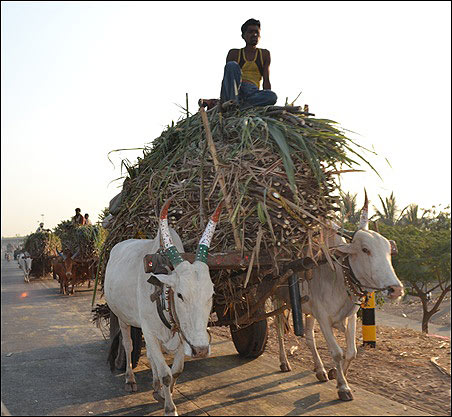Photographs: Courtesy, Wikimedia Commons
India will world's third largest economy by 2030 but its energy demand will slow down to 4.5 per cent, global energy giant BP plc said on Monday.
"By 2030 China and India will be the world's largest and third largest economies and energy consumers, jointly accounting for about 35 per cent of global population, GDP and energy demand," BP's chief economist Christof Ruhl said releasing BP's Energy Outlook 2030.
There would be 'no surge in energy demand as India industrialises.
For Rediff Realtime News On February 28 National Strike, . . .
India will be world's 3rd largest economy by 2030
Demand growth slows to 4.5 per cent per annum (vs. 5.5 per cent p.a. in 1999-2010) as improvements in energy efficiency partly offset the energy needs of industrialization and infrastructure expansion.'
India's dependence on imports to meet its gas needs will jump to 47 per cent by 2030 while the same for oil will grow to 91 per cent. The nation will be 40 per cent dependent on imports to meet its coal needs.
He said India remains on a lower path of energy intensity; by 2030 it consumes only about half the energy that China consumes today, at a similar income per capita level as in China on Monday.
For Rediff Realtime News On February 28 National Strike, . . .
India will be world's 3rd largest economy by 2030
Over the next 20 years China and India combined account for all the net increase in global coal demand, 94 per cent of net oil demand growth, 30 per cent of gas, and 48 per cent of the net growth in non-fossil fuels.
Coal remains the main commercial fuel, but its share falls from 70 per cent to 55 per cent in China as a result of maturing industrial structure, and from 53 per cent to 50 per cent in India due to domestic resource constraints.
For Rediff Realtime News On February 28 National Strike, . . .
India will be world's 3rd largest economy by 2030
Oil's share is flat at 18 per cent in China and falls to 26 per cent in India, constrained by prices and growing import dependency. Gas gains market share along with nuclear and renewables in both countries, BP said.
In India, the share of industry continues to grow, as infrastructure development catches up and manufacturing expands to absorb a growing labour force, but it never reaches the Chinese level.
"India therefore remains significantly less energy intensive, with a relatively high share of the service sector in GDP."
For Rediff Realtime News On February 28 National Strike, Click Here





article